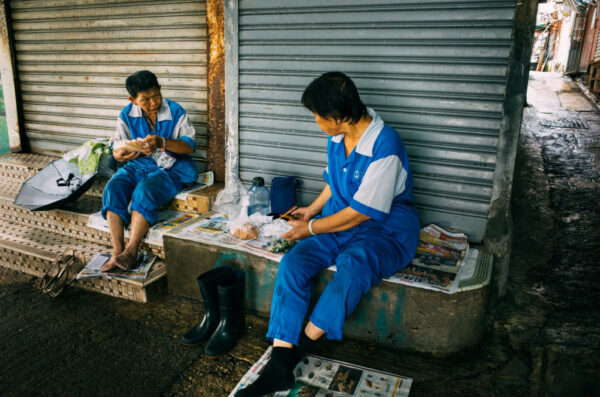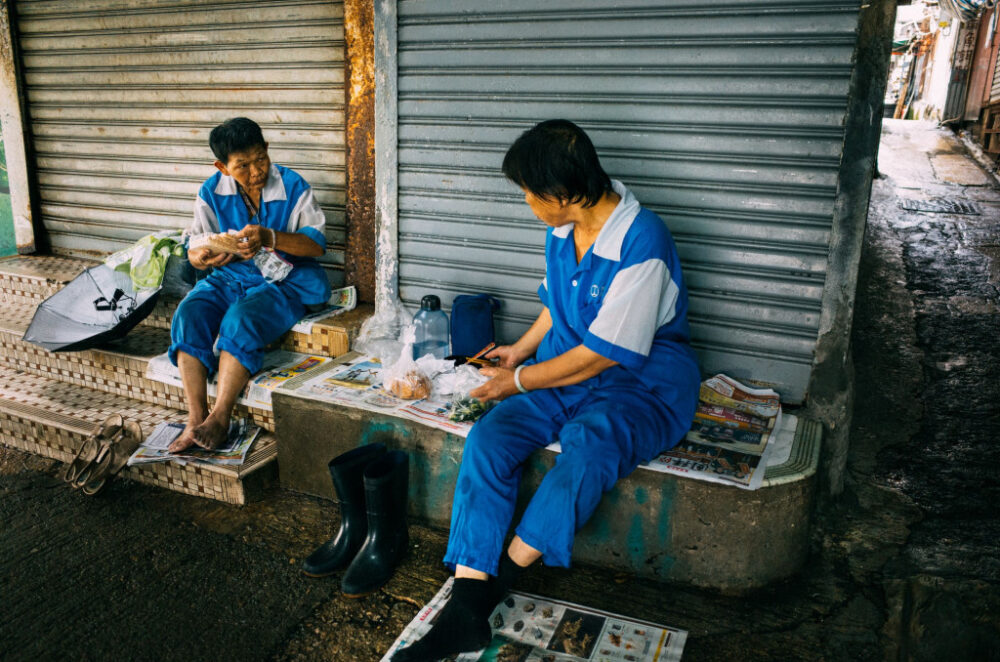If capitalism can’t afford a living wage and a pension for working people then we can’t afford capitalism!
Pasha, Socialist Action (CWI in Hong Kong)
Hong Kong is a rich city. In fact, it’s the world’s richest city. But it has long been riddled with high levels of poverty, which worsen as years go by. A recent report published by the Hong Kong government admits there are 1.37 million people living in poverty, with today’s poverty rate of 20.1 percent the highest in nine years.
One of every three elderly people is living in poverty, yet the government decided earlier this year to raise the age limit for receiving elderly CSSA from 60 to 65 years – a blatant rollback of social benefits.
At a recent Legislative Council (Legco) public hearing, 67-year old retired civil servant Mrs Wong described how her HK$3,000 per month pension is not nearly enough to make ends meet, and how she couldn’t find a job in the past two years, forcing her to scavenge for scrap cardboard on the streets.

Universal pension system
In response, Secretary for Labour and Welfare Law Chikwong said coldly, “You could seek job assistance from the Labour Department.” Such is the attitude of Hong Kong’s top officials towards the real livelihood issues facing senior citizens. Law, a former leading member of the Democratic Party, has always spoken out against a universal pension system, claiming it would result in chronic financial deficits.
This is utter hypocrisy; the white elephant infrastructure projects initiated by the government are costing Hong Kong almost its entire financial reserves. Yet we never see any government officials speaking out against them!
Young people are also not protected from the poverty crisis. 12.4 percent of youth in Hong Kong live in poverty, the highest level since 2010.
Although it may seem that Hong Kong’s workers enjoy a low unemployment rate, low-paid insecure jobs are becoming more and more prevalent. In 1987, the medium real disposable income of a university graduate was HK$17,490. Three decades later, this figure is merely HK$4,492 adjusted for inflation. This massive reduction in real living standards owes much to the sharp increase in property prices and rents.
Working poor
Over one-third (36.4 percent) of working families in Hong Kong are in poverty, which exposes the myth that “poor people are lazy”. Although the statutory minimum wage will increase from HK$34.5 to HK$37.5 per hour in May, this amount is far from sufficient to cover basic living costs. According to Oxfam, the hourly living wage should be HK$54.7, much higher than the current minimum wage.
There are currently 1.07 million workers in Hong Kong (including government outsourced labour) below this definition of a living wage, one-quarter of the total labour force.
The government is one of the main culprits for the rise in working poor, being one the largest employers of super-exploited outsourced labour. All governmental departments combined hire more than 37,000 outsourced workers, 80 percent of them on hourly wages of less than HK$36.5, earning between HK$7,000-8,000 a month.
Two months ago a photo of a government outsourced toilet cleaner eating his lunch in the washroom went viral on social media. Cleaners in public toilets usually work two shifts. The day shift is nine hours with a one-hour unpaid lunch break. The night shift is six to seven hours without any lunch break. The cleaner in the video did not have any lunch break and has to eat secretly in the washroom to avoid being penalised. The government responded that this arrangement is totally “legal”!
Women
The situation for women and migrant workers is even more dire. Women in general have a higher poverty rate than men. Aside from factors such as housewives not having an income, and the lack of a universal pension system, the pay disparity between genders is also very high.
According to research by the Women’s Foundation, working women on average earn 32 percent less than men. This systemic gender discrimination has forced many women into jobs in auxiliary, precarious and low-paid jobs.
As for Hong Kong’s 380,000 migrant domestic workers, despite the recent hike in their monthly minimum wage to HK$4,520 last year, this is a mere 2.5 percent increase and is still far below the wages of local workers.
The government also wants to import more migrant labour to work in sectors such as construction, security, elderly-care services, in order to drive down the wages for both local and migrant workers.
Only strong union organisation, insisting all workers have the right to join a union, engage in collective bargaining, and fight for a living wage in all branches of economy can counter these attempts to drive down wages and divide the working class.
If we look at GDP (gross domestic product, total economic output) per capita, theoretically everyone could share an average wealth of HK$30,000 per month. But the reality is that the bosses and the super-rich are literally stealing from the general public, leaving workers in hardship and poverty. Hong Kong’s poverty problem is artificial, a result of the collusion between the capitalist tycoons and their pro-capitalist government.
Down with capitalism
Based on the logic of capitalism, bosses pit workers against one another, the classic divide-and-rule, causing a race to the bottom in terms of wages and conditions. This maximizes profits for the capitalists. Now both the Beijing and Hong Kong governments are fervently attacking democratic rights – to strengthen the capitalist dictatorship and stamp out all workers’ struggles.
Therefore, workers must unite together, men and women, locals and migrants, against the capitalist order. We should demand massive government investment in public services, a universal pension and living wage for all, all financed by taxing the rich and taking the major tycoon-owned companies and banks into public ownership. This is also linked to fighting for real and full democratic rights.
One of the main weapons we need is a strong democratic trade union movement that can coordinate struggles for an 8-hour workday and a living wage. Unions have to be transformed from weak lobbying groups into real workplace organisations that can confront the bosses and defend workers’ rights. A new workers’ party is needed to advance workers’ interests and break the current deadlock in the democracy struggle – showing a working-class alternative to the undemocratic rule of the billionaires.




